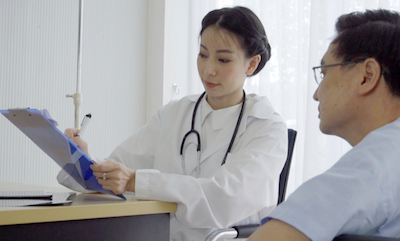Screening for Drug Use Can Be Reasonable, But Is Not Evidence-Based.
 In the June 9 issue of JAMA, the US Preventive Services Task Force (USPSTF) recommends that clinicians screen for unhealthy drug use (that is, any use of drugs that are illegal or medications not used for medical purposes) for all adult patients, but admits that there is still little evidence weighing the benefits and risks of this practice.
In the June 9 issue of JAMA, the US Preventive Services Task Force (USPSTF) recommends that clinicians screen for unhealthy drug use (that is, any use of drugs that are illegal or medications not used for medical purposes) for all adult patients, but admits that there is still little evidence weighing the benefits and risks of this practice.
Screening for unhealthy drug use “is reasonable to consider in clinical practice, but it is not evidence-based for improving health,” writes Richard Saitz, professor and chair of community health sciences, in an accompanying editorial.
“A service that likely has substantial harms for some, and small benefit for few under the most generous assumptions should be held to the same standards as other preventive services, regardless of whether it is a laboratory test that leads to an invasive treatment or a series of questions that lead to counseling and referral,” writes Saitz, who is also professor of medicine at the School of Medicine, and a physician in the Clinical Addiction Research and Education Unit and the Grayken Center for Addiction at Boston Medical Center.
In the editorial, Saitz points out that the USPSTF did not hold drug screening to the same standards to which it usually holds other preventive services it evaluates. Instead, he writes, the Task Force included studies of people who were seeking help for their drug use. Usually, evidence for preventive services comes from people who are asymptomatic and not seeking help, because interventions differ in terms of their effectiveness depending on whether people are seeking help or not. In the case of drug use, those seeking help are likely to be more amendable to changing their use than are people who are not seeking to change—and may not even think their use is risky. The only evidence the Task Force found for efficacy of drug screening, Saitz notes, was in people seeking help for cannabis use. There was no benefit for other drugs, such as opioids or stimulants, nor were there any effects on any health outcomes.
Saitz writes that screening is “not unreasonable” for clinicians, mainly because knowledge of a patient’s drug use is valuable and sometimes vital to understanding a patient’s health needs. Making screening standard practice could also help reduce stigma by demonstrating that drug use is a health issue, and might encourage patients to talk to their health care providers about their drug use and even seek treatment through them, he writes.
However, Saitz also points out that screening comes with risks, particularly during pregnancy: 23 states and the District of Columbia consider drug use to be child abuse, three states consider drug use grounds for civil commitment, Alabama considers drug use to be chemical endangerment of a child, and South Carolina considers drug use to be criminal child abuse. Drug counseling delivered poorly also poses risks, he writes, and having drug use on a patient’s medical record could expose them to stigma in their health care.
“These observations should serve as an important call for the development and study of new strategies to identify and address drug use in ways that can reduce related harms,” Saitz writes.
Read the full editorial here.